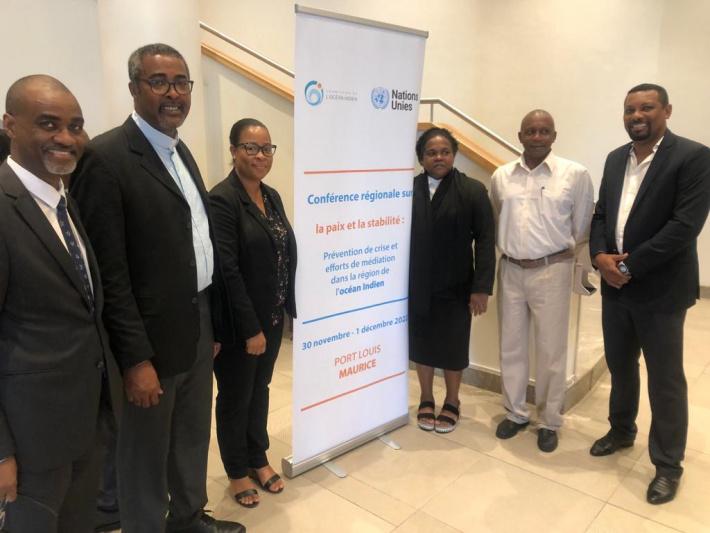Africa-Press – Seychelles. Strong Seychellois presence at the conference on crisis prevention and mediation effort.
Six Seychellois from different backgrounds took part in the work of the Conference on Peace and Stability: Crisis Prevention and Mediation Efforts held in Port Louis, Mauritius, last week.
Co-organized by the Indian Ocean Commission (COI) and the Department of Political Affairs and Peacebuilding of the Indian Ocean, this two-day conference is one of the activities of the Governance, Peace and Stability project (GPS) of the IOC and was assisted by about thirty people representing the Member States of the IOC and other international organizations such as the United Nations Organization (UN), the African Union (AU), the Southern Africa Development Community (SADC) and the Organization internationale de la Francophonie (OIF).
The Seychellois delegation was composed of the Permanent Liaison Officer of the Seychelles to the IOC, Mr. Ralph Agrippine; the representative of SIFCO (Seychelles Interfaith Council), Reverend Danny Elizabeth; Mme. Irene Sirame of the Office of the Prosecutor of the Republic; M. Michel Pierre, the vice-president of CEPS: Mme. Diana Benoit, director of the James R. Mancham Peace and Diplomacy Research Institute of the University of Seychelles; and M. Cliff Alissop from the disaster risk management division.
During the opening of the conference, Mr. Vêlayoudom Marimoutou, Secretary General of the Indian Ocean Commission (COI) emphasized that “our region of the Indian Ocean is globally at peace.” We have the chance – and this deserves to be emphasized – to live in a place of stability and great human diversity. However, the risk exists. We are within a few cables of tension zones; the nearby shores are the theater of open or hidden conflicts where criminal networks and malicious forces take hold; our ocean is coveted and, in fact, it is at the heart of global issues that are not exempt from risks; and finally, the multiform impacts of global shocks – climate, energy or pandemic – create situations of fragility, exacerbate inequalities, nurture pessimism and destabilizing temptations”.
SG Marimoutou pointed out that “this conference is a great opportunity to make a wish – not a pious wish like an overheard refrain but a wish in conscience and responsibility: let’s form the wish of a collective, sustained, systematic and open to prevent risks in Indian Ocean and ensure regional stability in the long term. It’s a completely realistic and achievable wish. To do this, we all have, at our level, a part of responsibility. The IOC will assume responsibility within the scope entrusted by its decision-making bodies. I hope that national institutions, regional and international organizations and our partners will contribute through a frank dialogue and a shared vigilance.
The conference was structured in three parts. The first part was dedicated to the introduction of principles and tools such as the concepts of mediation and preventive diplomacy, the second part on the experience of international and regional organizations in crisis prevention and mediation and the third part on the national appropriation in the maintenance of peace, the prevention and resolution of conflicts. It is during this third installment of the work of the conference that Diana Benoit made a presentation on the role of the James R. Mancham Peace and Diplomacy Research Institute of the University of Seychelles in maintaining peace in the Seychelles.
During the discussions in the different groups, the Seychellois representatives pointed out that even if the Seychelles has so far been able to avoid the crisis situation, the crisis factors exist within the society and that they must be eradicated addressing through fund debates that will pave the way for a positive peace.
For More News And Analysis About Seychelles Follow Africa-Press






